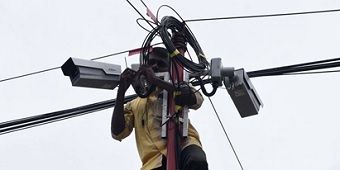The Coimbatore city police have introduced AI-based CCTV facial recognition systems (FRS) and Metadata cameras for detecting suspects. The cameras are being fixed within a 5-km radius of the City Police Commissioner’s office, where the modern control room is located.
Deputy Commissioner of Police (Coimbatore North) G Chandeesh said, “This is the first time in the state AI-based CCTV surveillance has been introduced. Even the existing system can capture pictures and videos of suspects. But we have to manually analyse the footage. The new system will automatically alert us once a suspect is identified.”
Explaining the working principle, he said, “We have a database of people with criminal records in CCTNS (Crime and Criminal Tracking Network and Systems). Our control room will bridge the feeds recorded by the Face Recognition cameras and CCTNS database. Once a suspect is identified, the software will capture the image and alert the control room,” he said.
According to sources, the AI-based system will also help police search for missing children and persons. The search using the photograph in the FRS will reveal the cases against the person in the police stations across the state. In the case of a suspect involved in criminal cases in other police stations, the police can pass on the information. Besides helping the police to track the criminals, the software can be used to verify the background of the suspects and to check if any warrant is pending against them, according to the sources. He said CCTV surveillance modernisation work is being carried out with an outlay of `60 lakh generated by auctioning old vehicles.
Explaining the functioning of Meta Data cameras, Chandeesh said “If someone flees after committing a crime, we usually gather the basic details of the suspect like his dress colour, vehicle type, etc. If we search with these details, the system separates the matches from its recordings through which we can trace the identities of the suspects,” he said.
The surveillance systems, however, raise concerns about privacy rights. Srinivas Kodali, a researcher and hacktivist with Free Software Movement of India, said, “Facial recognition technology has some major problems. The first is that its accuracy is nowhere perfect, meaning that employing the technology will result in many false positives. Replacing humans with technology does not reduce crime. Another major problem is that people have not consented to being scanned and it questions the individual privacy.”
“These monitoring facilities were brought in only for commercial establishments under the Public Safety Act in Telangana. Even when it was an enforced practice under the law, it could not avoid practical difficulties. That being the case, implementing this without any legislation would call into question the transparency and accountability of the process.
As there is no specific law for the surveillance of people through such facial recognition cameras, no rules and regulations can be made for it. So, surveillance of people through cameras without a specific law and without laying down rules and regulations for it, would question individual privacy,” he said. “It will also give extreme powers to the police as it is like the arms in their hand. Hence the constitutional and procedural safeguards are a must while implementing these systems, he added.








